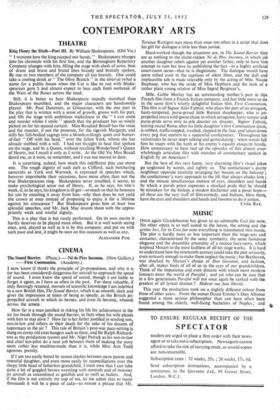CONTEMPORARY ARTS
THEATRE
King Henry the Sixth—Part HL By William Shakespeare. (Old Vic.)
" I WONDER how the king escaped our hands." Shakespeare plunges into his chronicle with his first line, and the Birmingham Repertory Company plunges with him, filling the stage with clash of arms, beat of drum and brave and brutal lines bravely and brutally spoken. By one or two members of the company all too bravely. One could take a cooling drink at " The Olive Branch " in the interval (what a name for a public house when the Cut is like to run with Shake- spearean-gore !) and almost expect to hear each fresh outbreak of the Wars of the Roses across the road.
Still, it is better to hear Shakespeare roundly mouthed than Shakespeare mumbled, and the major characters are handsomely played. Mr. Paul Daneman, as Gloucester, with the one part in the play that is written with a sense of growth, grows with his part, and fills the stage with ambitious wickedness in the " I can smile and murder whiles I smile " speech that the producer has so wisely picked on for his second curtain. Miss Rosalind Boxall has the voice and the manner, if not the presence, for the tigerish Margaret, and stills her full-bodied ragings into a bloodcurdlingly quiet and Matter- of-fact " Off with his head," over the fallen York, whom she has already stabbed with a will. I had not thought to hear that spoken on the stage, and by a Queen, without recalling Wonderland's Queen of Hearts, but 1 recall it only as I write. At the Old Vic Miss Boxall dared me, as it were, to remember, and I was too moved to dare.
It is surprising, indeed, how much this indifferent play can move one. The rough dignity of such oafs as Clifford, such butchering careerists as York and Warwick, is expressed in speeches which, however improbable their occasions, have more often than not the true Shakespearean ring. Shakespeare never troubled, it seems, to make psychological sense out of Henry. If, as he says, his title's weak, if, as he says, his kingdom is ill-got—so much so that he honours his son by entailing it away from him—why then does he not yield the crown at once instead of proposing to enjoy it for a lifetime against his conscience ? But Shakespeare gives him at least two splendid speeches, and Mr. Jack May invests them with the appro- priately weak and wistful dignity.
This is a play that is but rarely performed. On its own merits it hardly deserves to be played more often. But it is well worth seeing once, and, played as well as it is by this company, and put on with such pace and zest, it might be seen on this occasion as well as any.
ALEXANDER PYM.


































 Previous page
Previous page